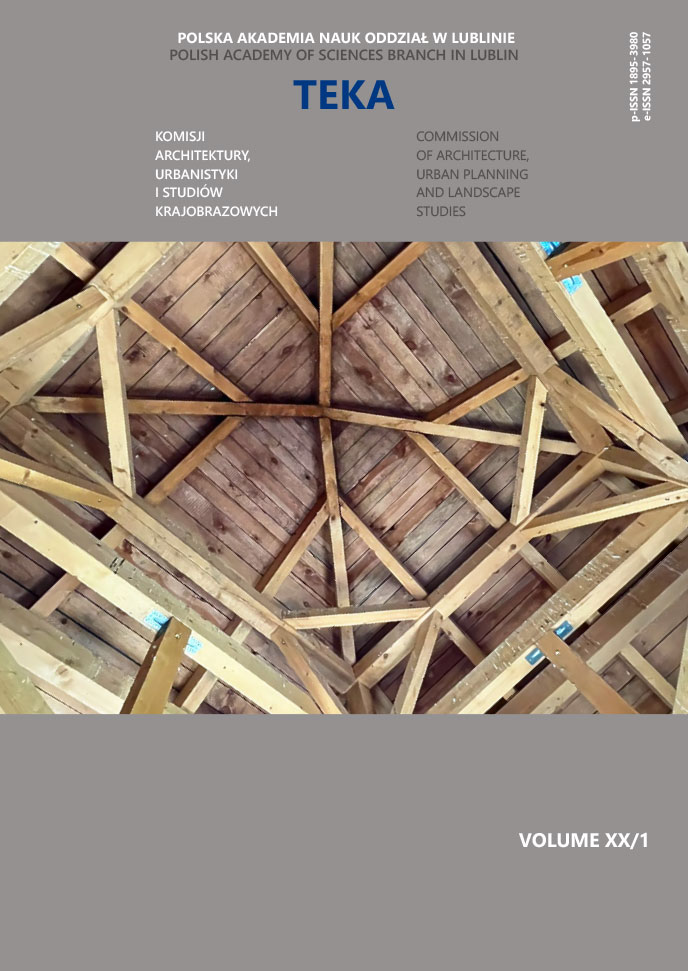Architektura wybranych dziennych centrów psychiatrycznych – studium przypadku
Rafał Strojny
r.strojny@pollub.plWydział Budownictwa i Architektury, Politechnika Lubelska (Polska)
https://orcid.org/0000-0002-2451-9152
Weronika Gospodarek
Koło Naukowe Architektury Zdrowia, Wydział Budownictwa i Architektury, Politechnika Lubelska (Polska)
https://orcid.org/0009-0005-4873-8092
Abstrakt
Spośród wszystkich obiektów służby zdrowia, obiekty o profilu psychiatrycznym są szczególnym przypadkiem, gdzie kluczowe jest skoncentrowanie na dobrostanie psychicznym pacjentów. Wpływ na to ma sama architektura, która może wzmacniać lub niwelować poczucie stygmatyzacji czy izolacji. Przedmiotem badań były trzy współczesne dzienne centra psychiatryczne zlokalizowane w Europie. Są one bardzo ważnym elementem struktury szpitali, zapewniając dostęp do leczenia psychiatrycznego dla osób kontynuujących leczenie po pobycie w szpitalu lub dla pacjentów niewymagających leczenia stacjonarnego. Celem badań było przedstawienie cech architektonicznych najciekawszych współczesnych dziennych centrów oraz ich ogólnej charakterystyki. Badania stanowi studium przypadku dwóch placówek z Francji oraz jednej z Hiszpanii. Pomimo niewielkiej skali, prezentują one nieszablonowe rozwiązania pod względem kształtowania formy budynku, gdzie na pierwszym miejscu jest komfort pacjenta. Kluczowym elementem tych obiektów była zieleń, naturalne materiały we wnętrzach, odpowiedni dostęp do światła naturalnego, kolorystyka oraz elementy sztuki we wnętrzach. Poza lokalizacją sprzyjającą integracji ze społeczeństwem, układ funkcjonalno-przestrzenny tych centrów jest przejrzysty i tworzy przyjazne przestrzenie dostosowane do ludzkiej skali i potrzeb, niwelując odczucie instytucjonalności, stygmatyzacji czy wyobcowania.
Słowa kluczowe:
architektura obiektów służby zdrowia, dzienne centra psychiatryczne, szpital psychiatrycznyBibliografia
Hagerup A., Wijk H., Lindahl G., Olausson S., Towards a Future Orientation: A Supportive Mental Health Facility Environment, “HERD: Health Environments Research & Design Journal” 2024, vol. 17(2), s. 38−56, doi:10.1177/19375867231221151.
Google Scholar
Strojny R., Współczesne tendencje w projektowaniu europejskich szpitali specjalistycznych, Rozprawa doktorska, Politechnika Lubelska, 2023.
Google Scholar
McCuskey Shepley M., Pasha S., Design for Mental and Behavioral Health, London and New York: Routledge, 2017.
Google Scholar
Liddicoat S., Badcock P., Killackey E., Principles for designing the built environment of mental health services, “The Lancet Psychiatry” 2020, vol. 7(10), s. 915−920, https://doi.org/10.1016/S2215-0366(20)30038-9.
Google Scholar
Bil J., Evidence Based Design for contemporary healthcare facilities, “Space&Form” 2015, vol. 22(1), s. 69−80.
Google Scholar
Bil J., Stigma and architecture of mental health facilities, “The British Journal of Psychiatry” 2016, vol. 108(5), s. 499−500.
Google Scholar
Yohanna D., Deinstitutionalization of People with Mental Illness: Causes and Consequences, “Virtual Mentor” 2013, vol. 15(10), s. 886−891, DOI: 10.1001/virtualmentor.2013.15.10.mhst1-1310.
Google Scholar
Nickl-Weller Ch., Nickl H., Healing Architecture, Berlin: Braun, 2013.
Google Scholar
Jabłońska J., Furmańczyk J., Healing Architecture in Mental Health Facilities in the New European Bauhaus Context, “Buildings” 2024, vol. 14(4), s. 1056, https://doi.org/10.3390/buildings14041056.
Google Scholar
Killaspy H., Psychiatric out-patient services: origins and future, “Advances in Psychiatric Treatment” 2006, vol. 12(5), s. 309−319, doi:10.1192/apt.12.5.309.
Google Scholar
Maoz H., Sabbag R., Mendlovic S., Krieger I., Shefet D., Lurie I., Long-term efficacy of a continuity-of-care treatment model for patients with severe mental illness who transition from in-patient to out-patient services, “The British Journal of Psychiatry” 2024, vol. 224(4), s. 122−126, doi:10.1192/bjp.2024.9.
Google Scholar
Roy A., Sivakumar T., Jayarajan D., Impact and Facilitators of a Psychiatric Rehabilitation Daycare Work Program: A Qualitative Study, “Indian Journal of Social Psychiatry” 2022, vol. 38(1), s. 21−25, DOI: 10.4103/ijsp.ijsp_347_21.
Google Scholar
Chijiiwa T., Ishimura K., Experiences of Psychiatric Day-Care Patients during the Introductory Period in Japan, “Open Journal of Therapy and Rehabilitation” 2020, vol. 8(3), s. 29−41, DOI: 10.4236/ojtr.2020.83003.
Google Scholar
Cook J.A., Burke-Miller J.K., Razzano L.A., Steigman P.J., Jonikas J.A., Santos A., Serious mental illness, other mental health disorders, and outpatient health care as predictors of 30-day readmissions following medical hospitalization, “General Hospital Psychiatry” 2021, vol. 70, s. 10−17, https://doi.org/10.1016/j.genhosppsych.2021.02.004.
Google Scholar
Hugunin J., Davis M., Larkin C., Baek J., Shekan B., Lapane K.L., Established Outpatient Care and Follow-Up After Acute Psychiatric Service Use Among Youths and Young Adults, “Psychiatric Services” 2022, vol. 74(1), https://doi.org/10.1176/appi.ps.202200047.
Google Scholar
Mellerup M., Sjöström K., & Örmon K., Recovery at an Adult Psychiatric Day Hospital—A Qualitative Interview Study Describing Patients’ Experiences, “Mental Health Nursing” 2024, vol. 45(6), s. 624−629, https://doi.org/10.1080/01612840.2024.2330565.
Google Scholar
Agarwal A.K., Rai S., Upreti M.C., Srivastava A.K., Sheeba., Day care as an innovative approach in psychiatry: Analysis of Lucknow experience, “Indian J Psychiatry” 2015, vol. 57(2), s. 162−4, doi: 10.4103/0019-5545.158157.
Google Scholar
Card A., Taylor E., Piatkowski M., Design for Behavioral and Mental Health: More Than Just Safety, The Center for Health Design 2018.
Google Scholar
https://richterarchitectes.com/centre-de-soins-psychiatriques-winicott/ (dostęp 03.11.2024)
Google Scholar
https://comas-pont.com/es/project/centro-medico-psicopedagogico-de-osona-osonament/ (dostęp 03.11.2024)
Google Scholar
https://www.ronzatti.com/adamant.html(dostęp 03.11.2024)
Google Scholar
https://www.theplan.it/eng/award-2019-Health/psychiatric-health-center-metz-france (dostęp 03.11.2024)
Google Scholar
https://www.jung.de/en/7988/references/psychiatry-centre-metz-an-der-mosel-france/3268/ (dostęp 03.11.2024)
Google Scholar
https://www.epsm-metz-jury.fr/psychiatrie-adulte/ (dostęp 11.11.2024)
Google Scholar
https://archello.com/project/psychopedagogical-medical-center (dostęp 11.11.2024)
Google Scholar
https://www.archdaily.com/870911/psychopedagogical-medical-center-comas-pont-arquitectos (dostęp 11.11.2024)
Google Scholar
https://www.osonament.cat/ (dostęp 11.11.2024)
Google Scholar
https://www.archdaily.com/934267/adamant-hospital-seine-design (dostęp 11.11.2024)
Google Scholar
Hawke L.D., Sheikhan N.Y., Bastidas-Bilbao H., Rodak T., Experience-based co-design of mental health services and interventions: A scoping review, “SSM – Mental Health” 2024, vol. 5, 100309, https://doi.org/10.1016/j.ssmmh.2024.100309.
Google Scholar
Liddicoat S., Mental health facility codesign: A new research method for integrating the service user voice in design processes using virtual reality, “General Psychiatry” 2019, vol. 32(3):e100061, doi: 10.1136/gpsych-2019-100061.
Google Scholar
Autorzy
Rafał Strojnyr.strojny@pollub.pl
Wydział Budownictwa i Architektury, Politechnika Lubelska Polska
https://orcid.org/0000-0002-2451-9152
Autorzy
Weronika GospodarekKoło Naukowe Architektury Zdrowia, Wydział Budownictwa i Architektury, Politechnika Lubelska Polska
https://orcid.org/0009-0005-4873-8092
Statystyki
Abstract views: 1PDF downloads: 1





